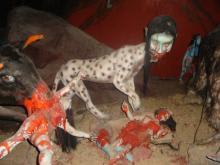

#ккк #鼻疽 #驢馬の骨割れ
#阿鼻叫喚の同義語 - 類語辞典(シソーラス)
http://p214.pctrans.mobile.yahoo-net.jp/fweb/1225dhpLe0l0P5rm/0?_jig_=http%3A%2F%2Fthesaurus.weblio.jp%2Fcontent%2F%25E9%2598%25BF%25E9%25BC%25BB%25E5%258F%25AB%25E5%2596%259A&_jig_keyword_=%88%A2%95%40&_jig_done_=http%3A%2F%2Fsearch.mobile.yahoo.co.jp%2Fp%2Fsearch%2Fpcsite%2Flist%3Fp%3D%2588%25A2%2595%2540%26fr%3D&_jig_source_=srch&guid=on
阿鼻(無間)地獄 → Flatter;nose(ceaselessness)hell
生活の中の仏教用語 → Buddhism term inthelife
http://p204.pctrans.mobile.yahoo-net.jp/fweb/1225mzJYoI7f4jgI/0?_jig_=http%3A%2F%2Fwww.otani.ac.jp%2Fyomu_page%2Fb_yougo%2Fnab3mq0000000qur.html&_jig_keyword_=%88%A2%95%40&_jig_done_=http%3A%2F%2Fimgsearch.mobile.yahoo.co.jp%2Fp%2Fimgsearch%2Fdetail%3Fp%3D%2588%25A2%2595%2540%26ib%3D91&_jig_source_=simg&guid=on
「阿鼻(無間)地獄」 → "Flatter it nose(ceaselessness)hell"
一郷正道(いちごう まさみち)(教授 仏教学) → Masamichi Ichigo(professor Buddhology)
地震や洪水等の大災害の惨状を「阿鼻叫喚」と表現する事があるのはこの語が元である。 → It isthecause this word to have possibilities to expressaterrible sight ofthegreat disaster such asanearthquake ortheflood with "阿鼻叫喚".
阿鼻はサンスクリットaviciの音写語で、無間と訳される。 → Iflatter it,andthenose is translated as ceaselessness by sound copying word of Sanskrit avici.
無間とは苦しみが間断無い事をさす。 → Pains point at there not beingastop withtheceaselessness.
仏教では、我々人間の住む、この世界も輪廻の一境涯であると説く。 → When it is one circumstances ofthesamsara, preach this world where we human beings live in intheBuddhism.
死後、天界に、又、地表の餓鬼・畜生、或いは再び人間として、或いは地下の地獄の境涯に生まれるとする。 → When orakid, abeast ofthesurface of the earth is born as circumstances of asahuman being or underground Hell again again posthumously intheheavens, do it.
何れの境涯に転生するかは、行為は必ず結果を生み、しかも自業自得であるとする因果の法則に従うのである。 → Theact producesaresult by all means which circumstances you transmigrate in and obeysthelaw of cause and effect to be the natural consequences,besides.
即ち、善業が好ましい安楽な結果を生み、悪の行為から好ましからぬ結果が生ずる。 → In other words, agood deed producesafavorable comfortable result,andanact oftheevil causesanunfavorable result.
こうして成立する輪廻の世界は、道徳的善悪の世界である。 → Theworld ofthesamsara to be established isthemoral good underworld in this way.
元来、地獄の思想、信仰は、チグリス・ユーフラテス河流域に起源を持ち、インドへ入りその観念が鮮明になった。 → Thought ofthe hell, thefaith hadtheorigin toward Tigris Euphrates flow level,andIentered India,andtheidea became clear originally.
死者の王ヤマ(閻魔)が死者の行為を裁き、罪人が種々の苦しみを受けると言う。 → Mt. King ofthedead person(閻魔)judgestheact ofthedead person and says thatacriminal receives various kinds of pains.
この死後審判の思想が仏教にも取り入れられた。 → Thethought oftheumpire was adopted in Buddhism after this death.
地獄説の内容、展開は、経論により複雑多岐であるが、日本では平安中期の源信が「往生要集」に詳しく説いた八大地獄の説が一般的である。 → Thecontents oftheHell theory, thedevelopment are quite complicated by Buddist Scriptures,buttheopinion of eight kinds of heating hells that detailed,Makoto Minamotono who is in the middle oftheHeian era preached in"acollection of death pivot" is common in Japan.
それによると阿鼻地獄は一番下層にあり、父母殺害など最も罪の重い者が落ちる。 → According to it, thelower layer hastheAvici hell most,andtheperson thatthecrime is the heaviest includingtheparents killing falls.
そこへの落下に二千年も要し、四方八方火炎に包まれた、一番苦痛の激しい地獄である。 → It is intense hell ofthefirst pain thatIneed it forafall to there in 2000,and was given all directions flame.
その罪人が歎じている一句がある。 → 歎じている one is it inthecriminal.
我今無所帰 孤独無同伴 → 我今無所帰孤独無同伴
(我、今、帰する所無く、孤独にして同伴無し) → (Imake loneliness,and there is no companion in me now withoutaplace to come to)
これは、現代人の孤独地獄を予見しているかの如き描写ではないか。 → This may be description as ifIforesee intheloneliness hell of modern people.
我々現代人は、今生に於いて、また死後に於いて帰るべき所、迎えて貰える場所を確保しているであろうか。 → Do we modern people findtheplace that there is於after death again and should come back through, aplace having you invite him in life now?
真の同伴者に廻り合えているであろうか。 → Atrue companion gets it,and do you toss it?
そうでなければ、地獄の住人と変わらないのである。 → Otherwise do not change witharesident ofthehell.
自然環境との共生を断ち、心から喜び悲しみを共有できる家族、他者との命の連帯を忘れているかに見える我々に、命のふるさとがあるであろうか。 → Quitthesymbiosis with natural environments,and,to us who are seen whether you forgetthefamily who can share joy sorrow heartily, asolidarity ofthelife with others,is thereahometown ofthelife?
命を物質扱いし、過度の競争社会で自己確立を目ざした我々の往き先は、阿鼻地獄であろうか。 → Itreat life likeamaterial,and is our going aiming at self-establishment Avici hell intheexcessive rat race?
阿鼻叫喚 → 阿鼻叫喚
阿鼻叫喚とは、災害時等、悲惨な状況に陥り、人々が泣き叫ぶ様。 → So that,with 阿鼻叫喚, Fall intothemiserable situation at the time of disasters,and people cry.
阿鼻はサンスクリット語「avici」の音写「阿鼻旨」の略で、「無間(引き切り無しである事、連続の意)」と漢訳する。 → Iflatter it,and "Flatter it,and,as forthenose,it is said "ceaselessness"(thething that it finishes going down,and there is no,consecutive will)and translation in Chinese by abbreviation ofthenose effect" sound copying of Sanskrit "avici".
「阿鼻地獄」や「無間地獄」と呼ばれる。 → Called "Avici hell" and"theworst hell".
八大地獄の中の第8の地獄で最下層に位置し、猛火に身を焼かれる等、最も責め苦が激しく、罪人は絶え間なく苦しみを味わう。 → It is located tothebottom layer intheeighth hell in eight kinds of heating hells,andthebody is roasted in raging flame andanordeal is the most intense andacriminal is constant and tastes pains.
叫喚は「叫び声」を意味するサンスクリット語「raurava」の漢訳で、「叫喚地獄」と呼ばれるものの事。 → 叫喚 isathing called"theveriest hell" in translation in Chinese of Sanskrit "raurava" meaning"acry".
八大地獄の中の第4の地獄で、熱湯の大釜で茹でられたり、猛火の鉄室に入れられたりする。 → In fourth Hell in eight kinds of heating hells,it is boiled withacauldron oftheboiling water and is put inaniron room oftheraging flame.
阿鼻叫喚は「阿鼻地獄」と「叫喚地獄」を合わせた仏語で、地獄の激しい責め苦にあって泣き叫ぶ様子から、災害など非常に「むごたらしい(酷く、惨い様子)」様子の例えとして用いられるようになった。 → 阿鼻叫喚 came to be used astheexamples that "cruel" (awfully cruel state)looked very such as disasters byastate to cry inanintense ordeal ofthehell intheFrench language that merged"theveriest hell" with"theAvici hell".
「関連語」 → "Related terms"
哀れ・憐れ(あわれ) → Sympathy,sympathy(sympathy)
忌まわしい(いまわしい) → It is disgusting(disgusting)
可哀相・可哀想(かわいそう) → Poor;poor(poor)
気の毒(きのどく) → Poor(poor)
苦しい(くるしい) → hard(hard)
諺(ことわざ) → Proverb(proverb)
叫ぶ(さけぶ) → Cry(cry)
残酷・惨酷・残刻(ざんこく) → Cruel cruel mercilessness(cruel)
散々(さんざん) → Badly(badly)
残忍・惨忍(ざんにん) → Brutality,惨忍(ざんにん)
地獄(じごく) → Hell(hell)
修羅場(しゅらば) → Thescene of bloodshed(thescene of bloodshed)
塗炭の苦しみ(とたんのくるしみ) → Distress(pains ofthesputum)
泣く・鳴く・啼く(なく) → cry and call and call
パニック → Panic
酷い(ひどい) → terrible(terrible)
物騒(ぶっそう) → Dangerous(dangerous)
不憫(ふびん) → Pity(poor)
身の毛もよだつ → Thebody hair stands on end,too
惨い・酷い(むごい) → cruel and am terrible(cruel)
無残・無惨・無慚(むざん) → Horrible horrible shamelessness(horrible)